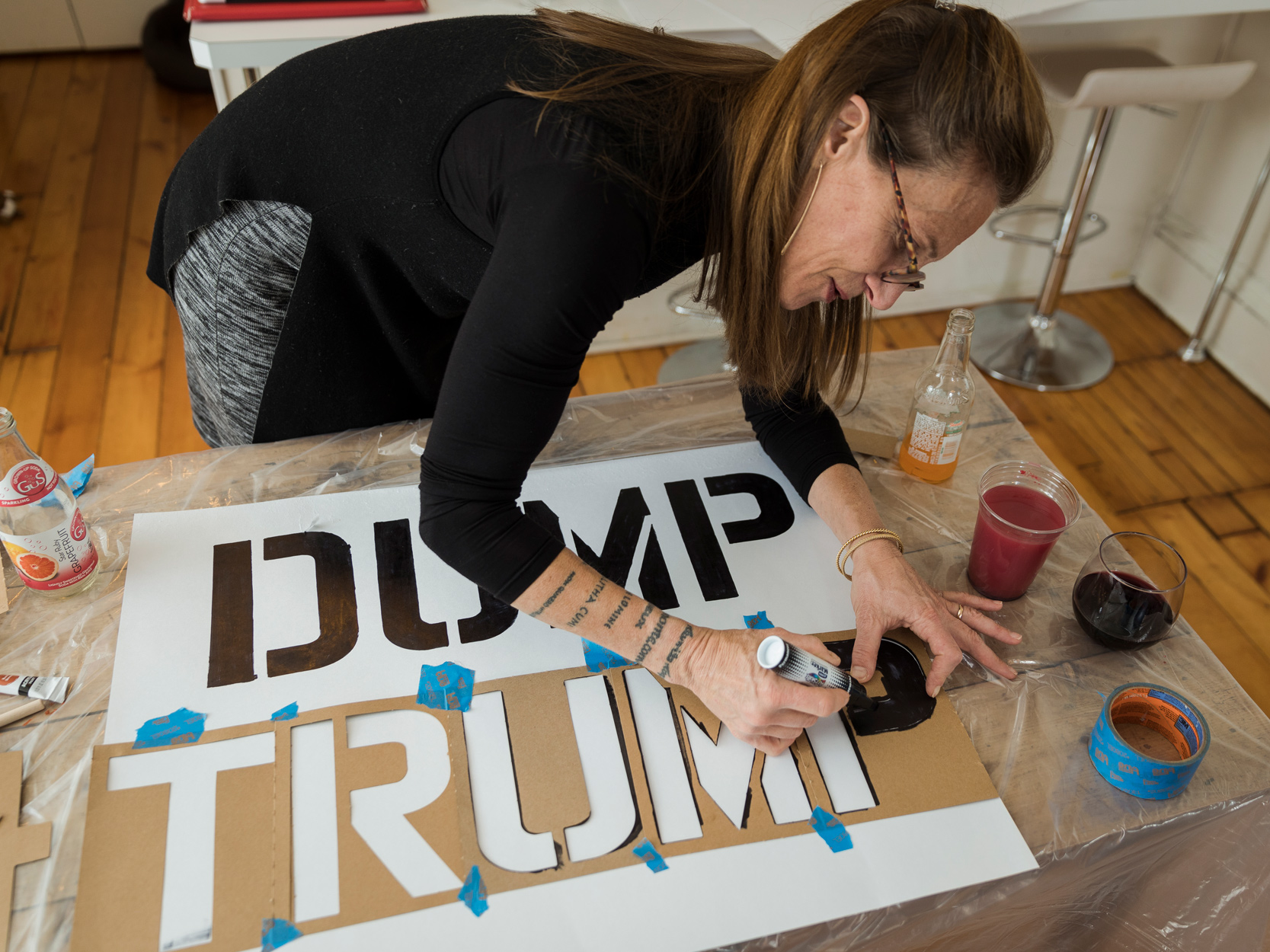Women’s March Draws ‘Duty-Bound’ From Wall Street
for The New York Times, published on Jan. 19, 2017

Hillary Ripley was on a stair climber at her Brooklyn gym when her 16-year-old daughter texted.
A women’s march was being organized in Washington, the teenager wrote, to protest the incoming administration of President-elect Donald J. Trump and to speak up for gender equality. Ms. Ripley hopped off the machine and began searching for a bus-charter company.
“I think about markets,” said Ms. Ripley, a longtime investor-relations professional who has worked in both banks and private equity firms. “It occurred to me immediately that there was going to be a tremendous demand for buses.”
She contacted US Coachways, got a quote for a 55-seat bus ($3,050 for a day trip) and began querying neighborhood friends to gauge whether she could recruit enough would-be marchers to break even. The seats quickly filled.
Across town at home on the Upper East Side of Manhattan, Alexandra Lebenthal, the chief executive of a stock and bond broker, was also making plans to travel to Washington.
“I never have done anything like this in my life before, and I just feel like it’s a time when everybody has to stand up for what they believe in,” Ms. Lebenthal, who was a Hillary Clinton supporter, said.
It is an unusual stance for a woman working in the cutthroat world of finance. Wall Street women — though often tough, tenacious and outspoken — are not a crowd accustomed to street protest.
They are professionals in trading, public relations, marketing, deal-making, investing and the law. They keep punishing schedules, fear losing business by offending their clients and often feel that in an industry still overwhelmingly populated by men, the less attention drawn to their sex, the better.
And many of them are employed by financial companies whose share prices have surged since Mr. Trump’s election, a move that could sweeten their compensation.
But the inauguration of Mr. Trump has prompted a striking number of Wall Street women to overcome their worries about demonstrating in public.
Based on interviews with numerous women from banks, hedge funds, other asset managers, financial law practices and private
A women’s march was being organized in Washington, the teenager wrote, to protest the incoming administration of President-elect Donald J. Trump and to speak up for gender equality. Ms. Ripley hopped off the machine and began searching for a bus-charter company.
“I think about markets,” said Ms. Ripley, a longtime investor-relations professional who has worked in both banks and private equity firms. “It occurred to me immediately that there was going to be a tremendous demand for buses.”
She contacted US Coachways, got a quote for a 55-seat bus ($3,050 for a day trip) and began querying neighborhood friends to gauge whether she could recruit enough would-be marchers to break even. The seats quickly filled.
Across town at home on the Upper East Side of Manhattan, Alexandra Lebenthal, the chief executive of a stock and bond broker, was also making plans to travel to Washington.
“I never have done anything like this in my life before, and I just feel like it’s a time when everybody has to stand up for what they believe in,” Ms. Lebenthal, who was a Hillary Clinton supporter, said.
It is an unusual stance for a woman working in the cutthroat world of finance. Wall Street women — though often tough, tenacious and outspoken — are not a crowd accustomed to street protest.
They are professionals in trading, public relations, marketing, deal-making, investing and the law. They keep punishing schedules, fear losing business by offending their clients and often feel that in an industry still overwhelmingly populated by men, the less attention drawn to their sex, the better.
And many of them are employed by financial companies whose share prices have surged since Mr. Trump’s election, a move that could sweeten their compensation.
But the inauguration of Mr. Trump has prompted a striking number of Wall Street women to overcome their worries about demonstrating in public.
Based on interviews with numerous women from banks, hedge funds, other asset managers, financial law practices and private
equity firms, it appears that dozens of industry women in New York, and perhaps significantly more, intend to make the trek to Washington to participate in the march on Saturday.
Some are driving, embarking in the wee hours to make it in time for a 10 a.m. rally. Some grabbed early Amtrak reservations before many of the trains sold out or, in one woman’s case, put 70,000 frequent-flier miles toward a ticket. Others, including a group of high-ranking women from Bank of America, are traveling by charter bus. Many describe it as a signal moment in politics, women’s rights and American history.
“I’m not a frequent demonstration participant,” said Jodi Schwartz, a corporate tax lawyer at Wachtell, Lipton, Rosen & Katz, a firm in Midtown Manhattan known for advising companies and banks on mergers and acquisitions.
Making time within a cramped schedule to attend the protest rather than taking the simpler route of writing a check to support the cause, Ms. Schwartz said, took some effort. But, she added, “as soon as I heard about this, I knew I was going to go because of my level of horror at the way folks are talking about women’s issues postelection.”
Ms. Schwartz cited a post she had seen on social media stating that 56 new legislative measures curbing women’s access to abortion had recently been announced. (The statistic, published by Naral Pro-Choice America, counted abortion bans and other restrictions on the procedure during 2016.)
The political climate, she said, is now “letting the cap off a lot of, I think, bubbling caldrons of anti-feminist activity.”
Catch up and prep for the week ahead with this newsletter of the most important business insights, delivered Sundays.
As a relatively affluent woman with the resources to maintain access to insurance and other services, Ms. Schwartz added, she felt “duty-bound” to go and speak for others who “might not have health care or might not have access to abortions.”
Ms. Schwartz’s concerns about the threats to gender equality, abortion rights and other freedoms appear to be widely held among her peers.
Some are driving, embarking in the wee hours to make it in time for a 10 a.m. rally. Some grabbed early Amtrak reservations before many of the trains sold out or, in one woman’s case, put 70,000 frequent-flier miles toward a ticket. Others, including a group of high-ranking women from Bank of America, are traveling by charter bus. Many describe it as a signal moment in politics, women’s rights and American history.
“I’m not a frequent demonstration participant,” said Jodi Schwartz, a corporate tax lawyer at Wachtell, Lipton, Rosen & Katz, a firm in Midtown Manhattan known for advising companies and banks on mergers and acquisitions.
Making time within a cramped schedule to attend the protest rather than taking the simpler route of writing a check to support the cause, Ms. Schwartz said, took some effort. But, she added, “as soon as I heard about this, I knew I was going to go because of my level of horror at the way folks are talking about women’s issues postelection.”
Ms. Schwartz cited a post she had seen on social media stating that 56 new legislative measures curbing women’s access to abortion had recently been announced. (The statistic, published by Naral Pro-Choice America, counted abortion bans and other restrictions on the procedure during 2016.)
The political climate, she said, is now “letting the cap off a lot of, I think, bubbling caldrons of anti-feminist activity.”
Catch up and prep for the week ahead with this newsletter of the most important business insights, delivered Sundays.
As a relatively affluent woman with the resources to maintain access to insurance and other services, Ms. Schwartz added, she felt “duty-bound” to go and speak for others who “might not have health care or might not have access to abortions.”
Ms. Schwartz’s concerns about the threats to gender equality, abortion rights and other freedoms appear to be widely held among her peers.



Many of the women interviewed said they were disgusted by Mr. Trump’s comments, including his suggestion of prohibiting Muslims from entering the United States, his mocking of a disabled reporter and the crass language he used to describe grabbing women’s genitals during a 2005 taping of “Access Hollywood” that surfaced in early October.
Some spoke, too, of concerns that what little progress they had seen on issues of fairness and diversity on Wall Street in recent years would be unwound in Mr. Trump’s America. Most said they had supported Mrs. Clinton for president.
At a gathering at her home on Tuesday, Ms. Ripley watched as her daughter, Hawthorne, and a group of friends also attending the weekend march made signs for the event. One of them read, “Leaders Lead. (Twits Tweet.)” Each participant was paying $80 for a seat on the bus, snacks, beverages and other supplies for the trip. The group planned to leave from a Brooklyn parking lot at 4:45 a.m. on Saturday.
Yet some Wall Street women said they were avoiding the march because they feared a backlash from colleagues, superiors or clients who were either fans of Mr. Trump’s or critics of public activism.
Some spoke, too, of concerns that what little progress they had seen on issues of fairness and diversity on Wall Street in recent years would be unwound in Mr. Trump’s America. Most said they had supported Mrs. Clinton for president.
At a gathering at her home on Tuesday, Ms. Ripley watched as her daughter, Hawthorne, and a group of friends also attending the weekend march made signs for the event. One of them read, “Leaders Lead. (Twits Tweet.)” Each participant was paying $80 for a seat on the bus, snacks, beverages and other supplies for the trip. The group planned to leave from a Brooklyn parking lot at 4:45 a.m. on Saturday.
Yet some Wall Street women said they were avoiding the march because they feared a backlash from colleagues, superiors or clients who were either fans of Mr. Trump’s or critics of public activism.
A 37-year-old woman who runs a portfolio at a hedge fund based in New York said she worried that ill-timed social-media pictures from the march could hurt her reputation in the business community.
Some managers at private equity firms and banks said they were torn between urging would-be marchers to take caution to avoid angering Trump supporters in the client base and encouraging free expression, regardless of the professional consequences.
Ms. Lebenthal, who runs one of the largest woman-owned brokerages on Wall Street, said she was unmoved by client concerns.
“I have friends that voted for Trump,” she said. “I have a major issue with that, but it’s their right. And I wouldn’t stop doing business with that person if they voted for Trump.”
As for clients who reconsider doing business with Ms. Lebenthal because of her involvement in the women’s march, she said, “If that happens, it happens.”
Some managers at private equity firms and banks said they were torn between urging would-be marchers to take caution to avoid angering Trump supporters in the client base and encouraging free expression, regardless of the professional consequences.
Ms. Lebenthal, who runs one of the largest woman-owned brokerages on Wall Street, said she was unmoved by client concerns.
“I have friends that voted for Trump,” she said. “I have a major issue with that, but it’s their right. And I wouldn’t stop doing business with that person if they voted for Trump.”
As for clients who reconsider doing business with Ms. Lebenthal because of her involvement in the women’s march, she said, “If that happens, it happens.”
by Kate Kelly